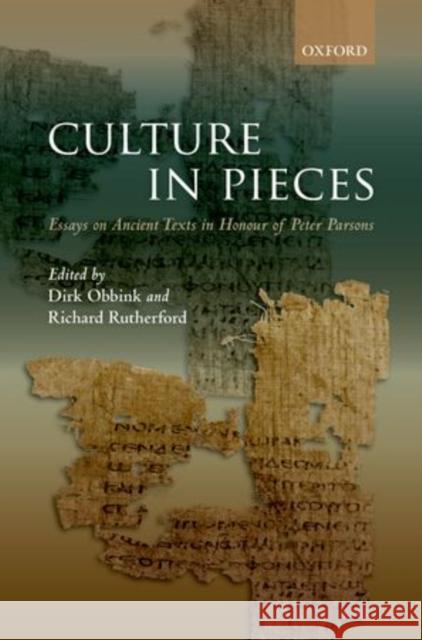Culture in Pieces: Essays on Ancient Texts in Honour of Peter Parsons » książka
Culture in Pieces: Essays on Ancient Texts in Honour of Peter Parsons
ISBN-13: 9780199292011 / Angielski / Twarda / 2011 / 368 str.
This volume originated in a conference of the same title, held in Oxford in September 2006, to celebrate the 70th birthday of Peter Parsons, Regius Professor of Greek at Oxford from 1989 to 2003. The contributors, who are former pupils, colleagues or collaborators with Peter Parsons, share a deep admiration for him and his work. Peter Parsons has, throughout his career, been engaged in research on newly discovered papyrus texts, and such texts play an important part in this volume's discussions. He has also constantly sought to use these texts to illuminate the literary and cultural history of antiquity. The essays in this volume are suitably diverse, reflecting the broad interests of the honorand: they straddle prose and verse, literary and subliterary texts, addressing both theoretical issues and specific practical problems of interpretation which contribute to the difficulties faced in giving form and meaning to the diverse and fragmentary evidence of ancient literary history - to give some kind of partial unity to 'culture in pieces'.
Broader topics considered include the methodology of editing fragments, the problems of identifying authorship (New Comedy being treated as a test case), the ambiguities of texts which may or may not be read as ironic, and the development of the Greek novel. Among major authors treated are Pindar, Euripides, Menander, Callimachus, and Ovid. The volume also includes an introduction outlining Peter Parsons's career and achievements, and a bibliography of his publications.
This volume originated in a conference of the same title, held in Oxford in September 2006, to celebrate the 70th birthday of Peter Parsons, Regius Professor of Greek at Oxford from 1989 to 2003. The contributors, who are former pupils, colleagues or collaborators with Peter Parsons, share a deep admiration for him and his work. Peter Parsons has, throughout his career, been engaged in research on newly discovered papyrus texts, and such texts play an important part in this volume'sdiscussions. He has also constantly sought to use these texts to illuminate the literary and cultural history of antiquity. The essays in this volume are suitably diverse, reflecting the broad interests of the honorand: they straddle prose and verse, literary and subliterary texts, addressing boththeoretical issues and specific practical problems of interpretation which contribute to the difficulties faced in giving form and meaning to the diverse and fragmentary evidence of ancient literary history - to give some kind of partial unity to 'culture in pieces'. Broader topics considered include the methodology of editing fragments, the problems of identifying authorship (New Comedy being treated as a test case), the ambiguities of texts which may or may not be read as ironic, and the development of the Greek novel. Among major authors treated are Pindar, Euripides, Menander, Callimachus, and Ovid. The volume also includes an introduction outlining Peter Parsons's career and achievements, and a bibliography of his publications.











